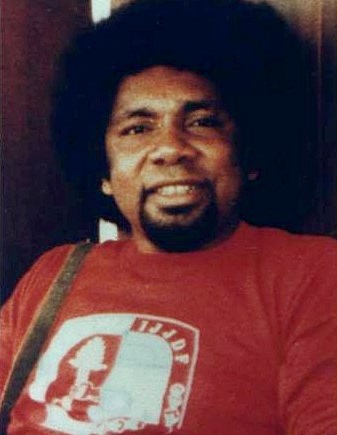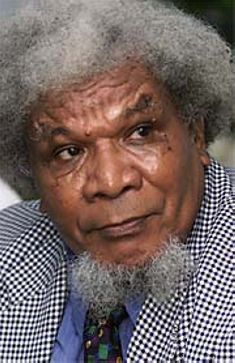The day following the seizure, a huge bonfire was organised in the main square of Jayapura, presided over by Indonesia’s Minister of Culture, Rusiah Sardjono. Symbols of public life, cultural artefacts, school textbooks and Papuan flags were set ablaze. About 10,000 Papuans were herded into the square to watch the ceremonial burning of what was described by Mrs Sardjono as ‘their colonial identity’.
Later that month, Presidential Decree No 8 imposed a ‘political quarantine’. All Papuan political activities were suspended and all Papuan political parties were disbanded. In doing this, the Indonesians recognised that the Papuan people had a distinctive culture and a thriving political life which had to be suppressed in order to make sure that Indonesia’s grip would not be challenged.
Although the Congress decided to pursue the path of dialogue, eschewing violence, alarmed army intelligence officers set up a special task force, which identified a number of ‘target persons’, including Theys Hiyo Eluay and other leaders of the PDP
The political assassination of two prominent Papuans illustrates this broader policy. The first was Arnold Ap, an anthropologist and popular broadcaster who was dedicated to fostering the cultural traditions of his people. He died in 1984. The second was Theys Hiyo Eluay, elected as the head of the Papuan Presidium Council (PDP) in 2000, and assassinated the following year.
Arnold Ap
 |
| Arnold Ap by Carmel Budiardjo |
Arnold Ap was the curator of the Anthropology Museum in Jayapura and a member of a music group called Mambesak, which promoted traditional Papuan music and broadcast a popular weekly program on local radio. He was arrested by troops of the elite corps, Kopassandha (now known as Kopassus), on 30 November 1983, during special operations that had been under way for several months. After interrogation and maltreatment, Ap was transferred to the regional military command with four other detainees. A month later, they were handed on to an intelligence officer of the local police. On being informed of Ap’s arrest, the Rector of Cenderawasih University temporarily dismissed him as curator, on the grounds that he had been arrested ‘on suspicion of subversion’. When the Indonesian daily, Sinar Harapan, reported that Ap’s family were being denied contact, the newspaper was publicly reprimanded.
After being held in military and police custody for three months, Ap was transferred to the public prosecution authorities. It was thought that formal charges would be made. On 14 April 1984 he was seen on campus escorted by an officer. A week later it was announced that he had escaped from prison with four other detainees. However, it turned out that the ‘escape’ had been organised by the authorities. An officer of Brimob, the police special forces, who later fled to Papua New Guinea, said the military authorities regarded Ap as ‘extremely dangerous because of the activities of his Mambesak players and wanted him sentenced to death or given a life sentence but could not find evidence for a charge in court’.
On 21 April, a Papuan police officer unlocked the cell doors of five detainees and ordered them out. They were driven by a Kopassandha officer to a coastal base camp. One of the detainees managed to escape and later fled to Papua New Guinea, where he described what had happened. The remaining detainees were told to swim out to a boat. One detainee, Eddy Mofu, was struck on the head and stabbed in the neck and thrown into the sea. The others took shelter in a cave. Four days later, when Ap left the cave to urinate, the area was surrounded by elite troops. He was shot three times in the stomach and stabbed in the chest. He was taken to hospital where he told a nurse that, should he die, his ring should be given to his wife. Other hospital staff said that he was dead on arrival.
Theys Hiyo Eluay
 |
| Theys Eluay by: Richard Samuelson |
The Papuan Presidium Council (PDP), which strongly supported independence, was set up at the Second Papuan Congress in May–June 2000, attended by many thousands from across West Papua. Theys Hiyo Eluay, chief of the Sentani tribe and a well-respected, high-profile community leader, was elected as its head. Back in August 1969, Theys was one of a number of West Papuan tribal chiefs who had been coerced into voting for the Act of Free Choice which sealed West Papua’s fate as part of Indonesia. He later made it clear that he had been taken from his home in the middle of the night and intimidated into supporting West Papua’s integration into Indonesia. Although the PDP decided to pursue the path of dialogue, eschewing violence, alarmed army intelligence officers set up a special task force, which identified a number of ‘target persons’, including Theys Hiyo Eluay and other leaders of the Council.
On 10 November 2001, Theys, was invited to a Heroes Day celebration at the headquarters of Kopassus troops in Hamadi, near Jayapura. On the way home, his car was ambushed, the driver was forced to flee and the car was driven away. The driver, Aristoteles Masoka, rushed back to the Kopassus base to report what had happened, but he was never seen alive again. The next day, Theys’s body was found 50 kilometres from the site of his abduction. The vehicle was upturned close to a ravine, creating the impression that there had been an accident. His face was black, with his tongue hanging out. An autopsy later confirmed that he had died of suffocation. His burial on 17 November was attended by over ten thousand people from all parts of West Papua.
Later, in the face of international outrage at the killing, seven Kopassus officers were tried and convicted of the crime; they were given three-and-a-half year sentences or less, while a senior Indonesian army officer hailed the convicted men as ‘heroes’.
Deserving of respect
Both Ap and Eluay were targeted for peacefully campaigning on behalf of the Papuan people for recognition of their distinct cultural and political identity. Their role in defining Papuan identity was outstanding and deserves respect by all who seek to understand the suffering and continued suppression of the Papuan people under Indonesian rule. ii
Carmel Budiardjo (
Inside Indonesia 94: Oct-Dec 2008
